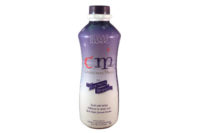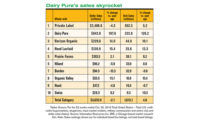
Got Flavored Milk?
Clearing up common misconceptions.
Beverage choices can play an important role in the overall quality of a child’s diet. Flavored milk has long been considered a favorite among children, but some may wonder whether it is as nutritious as plain milk. The following information, distributed by the Dairy Council of California to school superintendents and other decision-makers, is intended to answer some common questions about flavored milk.
Q:
Is flavored milk good for children?
A: Because flavored
milk is a good source of high-quality protein and offers children a package
of essential nutrients including calcium, magnesium, potassium and vitamin
D, it is considered a nutrient-rich beverage that supplies many of the
nutrients that children commonly under-consume.
The American Academy of Pediatrics recommends the
following daily intake of calcium for bone health: age 4 to 8, 800
milligrams (three servings); age 9 to 18, 1,300 milligrams (four servings).
Flavored milk, which is appealing to children and
teens, contains as much calcium as regular milk and is a great way to
help them meet the recommended three to four calcium servings daily.
Q:
Does flavored milk have the same amount of calcium and
vitamin D as regular milk?
A: One serving of flavored
or unflavored 100 percent milk provides about 300 milligrams of calcium, or
approximately one-third of a child’s recommended daily calcium intake
and one-quarter of an adolescent’s recommended intake.
Vitamin D is generally fortified in flavored milk at
the same level as it is in unflavored milk and milk is one of the most
common food sources. Adequate amounts of vitamin D are critical for calcium
absorption and maintaining strong bones. In light of recent reports of
increased fractures in adolescents and a resurgence in cases of rickets
among young children — caused by vitamin D deficiency —
ensuring an adequate intake of vitamin D is very important.
Q: Isn’t there a lot of sugar added to flavored
milk?
A: Flavored 100 percent
milk does contain some added sugar. However, most of the carbohydrate
(sugar) listed on the nutrient label is lactose, the natural sugar
found in milk. Flavored milk contains an equivalent of two to four
teaspoons of added sugar, or an additional 30 to 60 calories, per
serving.
In comparison, regular sodas contain up to eight
teaspoons of added sugar per serving. Fruit drinks, perceived by many to be
“healthy,” contain an equivalent of six to nine teaspoons of
sugar per serving.
Q:
Do the extra calories in flavored milk cause children
to gain weight?
A: With so many high-sugar
foods and drinks available, concern about possible weight gain is
understandable. However, research has shown that consumption of flavored
100 percent milk does not put children at a greater risk for consuming
additional calories that may lead to weight gain.
Researchers suggest that children’s sugar intake
does not increase with the consumption of flavored milk because the
consumption of soda and fruit drinks declines as milk consumption
increases. If you are watching your child’s calorie intake, you could
select flavored milk that is lowfat or fat free.
Q:
Is there a connection between eating three servings of
dairy foods each day and weight loss?
A: Emerging research
suggests that three servings of milk and dairy products each day, as part
of a reduced-calorie weight loss plan, can help adults lose more weight by
burning more fat than just cutting calories alone. Observational research
has found that dairy may play a role in promoting a healthy weight or
preventing unhealthy weight gain among children and adolescents.
Q:
Is flavored milk OK for people who are lactose
intolerant?
A: Scientific
research on this topic has shown that for individuals with lactose
intolerance, flavored milk, such as chocolate, may even be better tolerated
than unflavored milk. Health experts do not recommend that
individuals with lactose intolerance eliminate milk and dairy products from
their diet but rather consume moderate amounts to alleviate possible
discomfort.
Q:
Do the sugar and caffeine in chocolate milk cause
hyperactivity?
A: An 8-ounce serving of
chocolate milk has less sugar than a comparable serving in cola and about
the same as an equivalent serving of orange juice. An 8-ounce serving of
chocolate milk has only about one-tenth of the amount of caffeine found in
cola drinks and coffee. So, unless a child is extremely sensitive to sugar
or caffeine, consuming flavored milk will not affect his or her behavior or
activity level.
Q: Many schools are developing policies or standards that
determine which foods can be served on campus. Does flavored milk
meet those requirements?
A: The composition of
nutrients in most flavored 100 percent milk products meets the criteria for
acceptable beverages under California Senate Bills 12 and 965. In addition,
offering flavored 100 percent milk as part of school meal programs has been
shown to increase milk and nutrient intake, as well as overall school lunch
participation.
$OMN_arttitle="Got Flavored Milk?";?>
